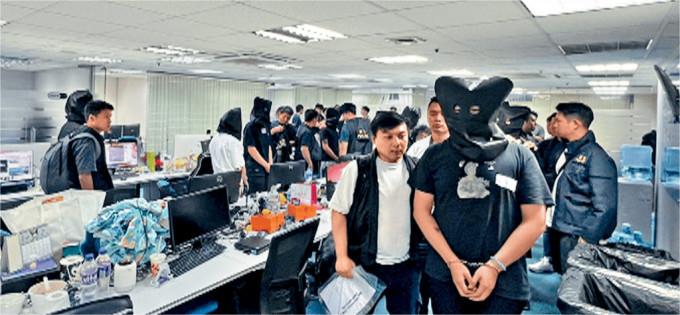The police announced the bust of a cross-border scam center located in a Hung Hom industrial building, arresting 27 relatively young individuals, including the mastermind and 6 employed university students.
The officers pointed out that the scam group recruited local university graduates majoring in digital media as "technology specialists," collaborated with overseas fraudsters and IT experts to build a fake cryptocurrency investment platform, and provided professional training to their scammers. They then targeted victims online, using "deepfake" technology to impersonate attractive women to develop online relationships, subsequently deceiving them into investing in cryptocurrency. The "fake beauties" also used the pretense of striving for a shared future to coax the victims into increasing their investments, thereby defrauding them of a substantial amount of money, initially estimated to involve over 360 million yuan.
In August this year, the police received intelligence about the scam group and, after two months of investigation, pinpointed the operation center's location and the identities of its members. On the 9th of this month, they launched the "covert language" operation, mobilizing over a hundred detectives from the New Territories South Regional Crime Unit, with assistance from the Cyber Security and Technology Crime Bureau in gathering evidence related to online and cryptocurrency transactions. During the operation, 27 individuals were arrested on suspicion of "conspiracy to defraud," including 21 men and 6 women, aged between 21 and 34, including key members of the scam group.
The personnel dismantled a nearly 4000-square-foot scam base located in a Hung Hom industrial building, seizing 41 computers and servers, as well as 137 mobile phones, and also recovered some of the criminal proceeds, including over 200,000 Hong Kong dollars in cash, a Rolex watch valued at 300,000 yuan, and a Richard Mille red watch worth 2 million yuan, owned by the 29-year-old gang-affiliated mastermind of the arrested scam group.
To make the victims fully trust them, the scam group would recruit local university graduates majoring in digital media as "technology specialists," and in collaboration with overseas fraudsters and IT experts, set up a fake cryptocurrency investment platform. Starting with online romances, they initially contacted victims on social platforms, sending photos generated by artificial intelligence to create favorable impressions of appearance, personality, profession, and education. They also used "deepfake" AI technology for video conversations, leading the victims to believe they were dating women with superior qualities, when in fact, they were speaking with male fraudsters.










